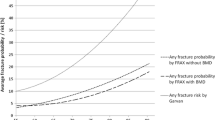Abstract
The aim of this study was primarily to determine the relationship between early menopause and the presence of fractures later in life, and secondly, to check for the significance of confounding factors (such as smoking habits, body mass index (BMI), weight and use of hormones). In this cross-sectional population based study, the subjects were 4725 postmenopausal women, 50–80 years of age, registered with 23 general practitioners (GPs). For the purpose of the present study, the total population was analyzed as well as the subgroup of 2757 women (the study population) with a natural menopause. Medical history questionnaire, weight, height and bone mineral density measurements were taken. Bivariate and multivariate analyses were carried out with documented fractures in three categories: during lifetime; after menopause and after age 50 years) as dependent variable and age, BMI, bone mineral density, weight, smoking habits, use of hormones and early menopause as independent variables. The total study population as well as the subgroups "early" and "normal menopause", stratified in three 10-year and in six 5-year categories, were analyzed. Results are expressed as odds ratio and 95% confidence intervals (CI). Multivariate logistic regression analysis revealed that over 70 years of age, BMD≤0.800 (t-score<2.5) and early menopause were the only systemic independent predictors of all three fracture categories. Comparing the subgroups normal menopause and early menopause, the early menopause group showed a statistically significant higher overall fracture rate (OR=1.5; CI 1.2–1.8). Over age 70, the difference in the prevalence of fractures reached statistical significance in each age category (OR: 1.8 and 2.1, respectively). Smoking was found to be associated with early menopause (OR=1.5; CI 1.2–1.8) but not with the presence of fractures. Height above 165 cm was found to be associated with a higher prevalence of fractures during lifetime. The present study shows that early menopause is statistically significant associated with the presence of fractures during lifetime, after age 50 years and after menopause. Especially at older age, early menopause is an important predictor of fractures.
Similar content being viewed by others
References
WHO Study Group (1994) Assessment of fracture risk and its application to screening for postmenopausal osteoporosis. WHO Technical Report series 843, Geneva
Van der Voort DJM, Geusens PP, Dinant GJ (2001) Risk factors for osteoporosis related to their outcome: fractures. Osteoporos Int 12:630–638
Meijer HE, Tverdal A, Selmer R (1998) Weight variability, weight change and the incidence of hip fracture: prospective study of 39000 middle-aged Norwegians. Osteoporos Int 8:373–378
Meyer HA, Tverdal A, Falch JA (1995) Changes in body weight and incidence of hip fracture among middle aged Norwegians. BMJ 311:91–92
Tromp AM, Ooms ME, Popp-Snijders C, Roos JC, Lips P (2000) Predictors of fractures in elderly women. Osteoporos Int 11:134–140
Ensrud KE, Cauley J, Lipschutz R, Cummings SR (1997) Weight change and fractures in older women. Study of Osteoporotic Fractures Study Group. Arch Int Med 157:857–863
Cooper C, Shah S, Hand DJ, Adams J, Compston J et al. (1991) Screening for vertebral osteoporosis using individual risk factors. Osteoporos Int 2:48–53
Pouilles JM, Tremollieres F, Bonneu M, Ribot C (1994) Influence of early age at menopause on vertebral bone mass. J Bone Miner Res 9:311–315
Ohta H, Sugimoto I, Komukai S, Suda Y, Makita K, Takama K et al. (1996) Decreased bone mineral density associated with early menopause progresses for at least ten years: cross-sectional comparisons between early and normal menopausal women. Bone 18:227–231
Gambacciani M, Spinetti A, de Simone L, Cappagli B, Maffei S et al. (1993) The relative contributions of menopause and aging to postmenopausal vertebral osteopenia. J Clin Endocrinol Metab 77:1148–1151
Ahlborg HG, Johnell O, Nilsson BE, Jeppsson S, Rannevik G et al. (2001) Bone loss in relation to menopause: a prospective study during years. Bone 28:327–231
Nordin BE, Need AG, Chatterton BE, Horowitz M, Morris HA (1990) The relative contribution of age and years since menopause to postmenopausal bone loss. J Clin Endocrinol Metab 70:83–88
Luisetto G, Zangari M, Tizian L, Nardi A, Ramazzina E et al. (1993) Influence of aging and menopause in determining vertebral and distal forearm bone loss in adult healthy women. Bone Miner 22:9–25
De Bruin JP, Bovenhuis H, Van Noord PAH et al. (2001) The role of genetic factors in age at natural menopause. Hum Reprod 16:2014–2018
Van Noord PAH, Dubas JS, Dorland M et al. (1997) Age at natural menopause in a population-based screening cohort: the role of menarche, fecundity, and lifestyle factors. Fertil Steril 302:95–102
Harlow BL, Signorello LB (2000) Factors associated with early menopause. Maturitas 28:3–9
Cramer DW, Harlow BL, Xu H, Fraer C, Barbieri R (1995) Cross-sectional and case-controlled analyses of the association between smoking and early menopause. Maturitas 22:79–87
Law MR, Hackshaw AK (1997) A meta analysis of cigarette smoking, bone mineral density and risk of hip fracture: recognition of a major effect. BMJ 315:841–846
Van der Voort DJM, Dinant GJ, Rinkens PELM, Van der Voort-Duindam CJM, Van Wersch JWJ, Geusens PP (2000) Diagnostic accuracy of an algorithm for quick detection of patients with low bone mineral density in everyday general practice. J Clin Epidemiol 53:1095–1103
SPSS (1990) SPSS statistical software manual. SPSS Inc., Chicago
Van der Voort DJM, Brandon S, Dinant GJ, Van Wersch JWJ (2000) Screening for osteoporosis using easily obtainable biometrical data: diagnostic accuracy of measured, self-reported and recalled BMI, and related costs of bone mineral density measurements. Osteoporos Int 11:233–239
Van de Lisdonk EH, Van den Bosch WJM, Huygen FJA, Lagro-Jansen ALM (1990) Ziekten in de huisartspraktijk. Bunge, Utrecht
Metsemakers JFM, Höppener P, Knottnerus JA, Kocken RJJ, Liomonard CBG (1992) Computerized health information in the Netherlands: a registration network of family practices. Br J Gen Pract 42:102–106
Author information
Authors and Affiliations
Corresponding author
Rights and permissions
About this article
Cite this article
van der Voort, D.J.M., van der Weijer, P.H.M. & Barentsen, R. Early menopause: increased fracture risk at older age. Osteoporos Int 14, 525–530 (2003). https://doi.org/10.1007/s00198-003-1408-1
Received:
Accepted:
Published:
Issue Date:
DOI: https://doi.org/10.1007/s00198-003-1408-1




